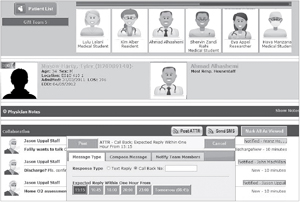Faik Naim is a patient on your unit. You've been told to tell Faik's physician that the Naim family will be in tomorrow and would like to speak about Faik's next steps.
Because you're a student, you've only been on the unit for two weeks and don't know everyone yet. Further, your shift only started 10 minutes ago so you're not sure who is a part of Faik's care team. Beside you is a list of physician names and a pager number beside each.
 You page the first name on the list and wait.
You page the first name on the list and wait.
And wait.
And the longer you wait, the more time you have to ask yourself:
Should you have paged at all? It's not the most pressing request the physician will deal with today.
Did you page the right doctor?
Are they working today?
Did the page go through?
Did you type the pager number correctly?
Did you even leave the right call-back number?
You decide to continue on with your work and hope to hear when they call back.
* * *
A physician is in consult with a patient when her pager goes off. She excuses herself and steps out of the room to find a phone. She calls the number and asks if anyone paged her. The ward clerk asks around and uses the overhead paging to ask if anyone paged.
* * *
Unfortunately, you are busy with one of your patients and do not recognize the name of the person you called. Some time has passed and you are no closer to identifying the care team or notifying them about the visit than you were at the start of your shift.
* * *
Does this scenario sound familiar?
In this instance, it's nothing more than an inconvenience, but it's not hard to imagine the problems this situation presents if the information were more urgent or even critical.
UHN's Centre for Innovation in Complex Care (CICC) has developed a solution—a clinical messaging application that streamlines communication on medical wards.
"Staff on our unit can log in and immediately see every member of a care team just by clicking on the patient's name," explains Dr. Robert Wu, Research Director, CICC, and General Internist, TGH. "I know immediately who from the team I need to reach and can send a message directly to his/her smartphone all within the app."
Instead of the one-buzz-fits-all approach of a pager, or the less-nuanced BlackBerry messaging, the app is an integrated messaging tool that connects the unit. And it connects them in more ways than one.
The makeup of a unit changes every two months, creating an ongoing challenge.
"Adding a photo to staff profiles improves interprofessional collaboration," says Sherman Quan, Director, Health IT solutions, CICC. "The app helps the nurses, doctors, allied health workers and pharmacists get to know each other better because they recognize them before their first meeting."
"It's like a medical Facebook," laughs Sherman.
And like Facebook, there are still a lot of changes taking place. Unlike Facebook, however, these changes are invariably positive.
One of the prominent additions still to come is a patient interface.
"Once patients can access the app they'll know who's caring for them and understand better the role each person plays in their care, a common desire among patients," says Eva Appel, Health Informatics Coordinator, CICC. "They'll be able to provide real-time feedback to their care team so that adjustments can be made in time to impact that patient."
"Patients are the most important person in their care team and we would like to enable them to communicate with their clinicians through the system," says Robert. "We'd also like to develop features such as medical checklists and real-time balanced team scorecards which can dramatically improve care."
The impact of Clinical Messaging is already garnering attention. It recently received a blessing from corporate industry in the form of a Bronze award at the Edison Awards in New York City—one of the highest accolades a company can receive for innovation and business. Other players at the event included large multinational Windows, Ford, GE and even IBM's Watson (well, his team).
While it's only in use on the TGH General Internal Medicine unit right now, Eva is quick to remind us that "care doesn't end when people leave this ward." And Sherman says that the plan is to continue developing this app and eventually make it available to everyone because these are common problems everyone experiences.
But maybe not for long…
